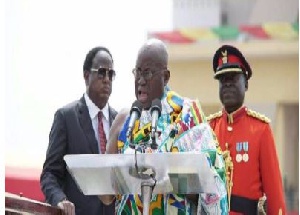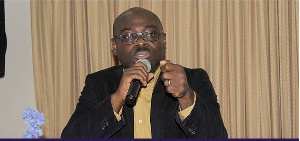Opinions of Monday, 29 May 2017
Columnist: Francis Kwarteng
Akufo-Addo’s plagiarized speech, an enemy of Science and Technology
Akufo-Addo’s inaugural plagiarized speech raised eyebrows at the much-vaunted competence of the incoming government.
However, in the days following the international disgrace occasioned by this gross technical miscalculation on the part of Akufo-Addo and the reported writer of the said speech, Eugene Arhin, a number of keen observers, including ordinary columnists and bloggers, began to seriously question why we keep plagiarizing speeches by Western leaders rather than their technology.
On the face of it this critique might seem egregious and unethical. Obviously those who are particularly against this line of thinking are concerned about the crime of intellectual dishonesty.
Contrary to what others may think of this, that is, the idea of plagiarizing Western technology, we still are of the strong opinion that no one in his right senses will raise any objections to the logical subtext of this critique. Prof. Calestous Juma captures the underlying infrastructure of this critique for us. He writes:
“Africa has the opportunity to start from scratch by leapfrogging the legacy technologies that the industrialized nations are now burdened with. Mobile phones represent a powerful metaphor of how to think about the ecological function of technological leapfrogging in Africa.”
The fact is that it is technology—and not natural resource assets per se—that truly rules the world. Ghana and Africa for that matter, if we may also add, are far behind the technological race.
We cannot overemphasize that technology does harbor enormous implications for health, agriculture, energy, food production and security, employment and unemployment issues, environmentalism, life expectancy, problems of water management and engineering, and so on.
Unfortunately, it seems as though African leaders are slow to realize these potential existential truths about the enormous utility of technology, and how we can commit technological resources to improving the human condition.
At this point let us take a quick look at one of Prof. Juma most insightful commentaries on the need for Africa to catch up with the technological race:
“The key distinctive feature of the strategy is the recognition that Africa cannot sustain economic growth and promote prosperity without significant investments in technological innovation. It is a departure from traditional growth strategies that focus on raw material exports. This is a bold attempt to reposition Africa as a player in the global knowledge economy.
“It emphasizes the strategic role of technological innovation in addressing critical challenges such as meeting human needs (such as food and health), improving international competitiveness through trade in manufactured goods, and protecting the environment.”
Thus, Prof. Juma answers many of Africa’s technical and non-technical problems in one fell swoop of informed appreciation of Africa’s myriad problems and, perhaps, most significantly, of outstanding knowledgeability of development economics.
He further makes the subtle claim that moving away from traditional growth strategies based on the Guggisberg economy, so-called, to technological innovation constitutes a progressive path of development worth pursuing by the technocratic managers of African economies. This idea deserves no further complimentary reinforcement in this article since we have covered it almost exhaustively elsewhere.
Let us just say that technological innovation represents the missing link between natural resource assets and true wealth.
And yet technological innovation is a state of mind. It is a state of mind because the conceptual origination of technology itself does not exist outside the creative immanence of human consciousness.
It is also possible that the optimal interactions between immanence and the environment are what dictate a particular strategy of technological response to the human condition.
This is why we need to put up the proper institutions to produce the kind of human capital with enormous capacity for technological innovation.
Investing in research and development (R&D) and industrial espionage techniques, and fighting public corruption, are three important channels through which to divert much-needed financial resources into technological innovation.
Just as importantly, the late Michael Crichton’s international best-selling work of fiction “Rising Sun” gives us an inkling of what industrial espionage entails, or is all about.
On the other hand we need to consider bringing our great men and women of the diaspora, in the West especially, such as Dr. Victor Lawrence, on board. We have profiled technologically innovative scientists and engineers, such as the latter, Dr. Lawrence, and readers who are not familiar with his work and inventions can always go back and read our articles on him and others.
Finally, maintaining existing infrastructure and upgrading the technical competence of the continent are the other variables to consider. Here is Prof. Juma again:
“The first is to build infrastructure—mainly energy, transportation, water and sanitation, irrigation, and telecommunication. Poor infrastructure is a key obstacle to Africa’s economic development and affects activities ranging from agriculture to health and scientific research.
“Second, Africa will need to upgrade its technical competence and create the skills needed to respond to emerging economic and environmental challenges. This will be done through improving science, technology, engineering, and math education.”
Prof. Juma primarily focuses on S.T.E.M. education as the appropriate pedagogical or instructional pathway that should take us to the desired destination of technological innovation.
We could also add instructional investment in Information and Communication Technology (ICT).
Akufo-Addo’s inaugural speech missed these fine points because the writer of the speech focused on plagiarizing speeches by Bill Clinton and George Bush rather than exploring some of these pertinent questions. Most significantly, the entire speech of almost 2,643 words captured each of the words “science” and “technology” only once and even that in passing. Here was Akufo-Addo:
“We must expand our horizons and embrace ‘science’ and ‘technology’ as critical tools for our development (emphasis added).”
SOME CRITICAL PERSPECTIVES
Thus in the much broader sense of comparative geography Africa should reject the Eurocentric construction of history as presented to us in Jared Diamond’s Pulitzer-winning book/film “Guns, Germs, and Steel” and move on, as a matter of fact on its own terms of technological pursuit in the particular contexts of comparative advantage and pragmatic nationalism.
As a matter of fact the outstanding intellectual legacy and vigorous scholarship of the late Cheikh Anta Diop seriously call into question the underlying assumptions of Diamond’s work, exposing its methodological and ideological flaws among other things.
Then also we should not gloss over the scientific arguments Prof. Kofi Kissi Dompere advances in two of his recent publications—“The Theory of Philosophical Consciencism: Practice Foundations of Nkrumaism in Social Systemicity” and “The Theory of Categorial Conversion: Rational Foundations of Nkrumaism in Socio-Natural Systemicity and Complexity.”
We must also bear in mind Prof. Molefi Kete Asante’s “Revolutionary Pedagogy: Primer for Teachers of Black Children,” all three of which are essential to laying down a strong foundation for the pursuit of technological innovation.
Paulo Freire’s “Pedagogy of the Oppressed” is another good one, so too are developmental psychologist Howard Gardner’s “theory of multiple intelligences” and books “Frames of Mind: The Theory of Multiple Intelligences” and “Multiple Intelligences: New Horizons in Theory and Practice” and “The Unschooled Mind: How Children Think and How Schools Should Teach.”
In fact technology is the real deal. In the main whether technology is inherently good or evil largely depends on the health or condition of that state of mind, already mentioned. The sad part of it all is that we have proved incapable of maintaining our industries and public capital.
Most of the industries Kwame Nkrumah left behind have been sold off due to poor management and maintenance. Thus pursuing technological innovation in and of itself is not the end of the story. It is more complicated than that. As a matter of fact issues of proper maintenance and management of these structures, including technological inventions, do matter a lot. Then intellectual property issues also add to the complex mix of technological innovation, management, partisan politics, institutional corruption, and maintenance, at least as far as Ghana is concerned.
On a more serious note, for us to make headway in the arena of technological innovation means we must break out of the cycle of neocolonial dependency. We also need to fight institutional corruption, promote an enabling culture of inventiveness, take S.T.E.M.-education Information and Communication Technology (ICT) seriously, collaborate with others already in the lead of technological innovation and scientific advancement, incentivize innovative researchers in S.T.E.M. education, and change the current system of education where rote memorization dominates.
The collaboration between the KESHE Foundation, BONADES Limited, and the Ghana Atomic Energy Commission is an excellent example in knowledge partnerships and transfer. And, certainly, last but not least, we should thus encourage and nurture healthy curiosity in schoolchildren, while fighting the scourge of ephebiphobia in our culture.
And also, finally, if we expect to be respected among the community of nations then we must as well endeavor to give high priority to technological innovation. There is no denying the fact that our survival depends on it. Listen to Bob Marley’s “Survival”:
“In this age of technological inhumanity…black survival
“Scientific atrocity…survivors
“Atomic misphilosophy…black survival
“Nuclear misenergy…survivors
“It's a world that forces lifelong insecurity…black survival…
Or perhaps Bob Marley was talking about black resilience in the face of slavery, colonialism, and imperialism?
Whatever the interpretation of this song, the point is that we should harness the benefits of technological innovation to improve the lot of the generality of human beings on the planet.
Technology should bring us together given the inviting charisma of diversity against a backdrop of our common humanity.
“One Love! One Heart!...
“Let's get together and feel all right.
“One more thing:
“Let's get together to fight this Holy Armageddon…
This is what technological innovation should be about, “One Love” as Bob Marley called it!
CONCLUDING REMARKS
With the so-called gig economy and automation taking root in industrialized economies and emerging ones, one is at a lost to explain what these emerging trends will mean for the global economy, particularly African economies, and for the standards of living and quality of life for the teeming generality of human beings.
We have at the back of our minds subjective metrological indices such as happiness economics, the World Happiness Report, and the Human Development Index (HDI). The other issue regarding how we view ethical implications of emerging technologies is also important.
But we should never forget that it is the profit motive (rational choice theory) primarily, together with the additional factors of self-interest and greed, which constitute the major economic agents driving automation. There are a number of reasons why automation is pursued but we will reserve that for another paper.
Here, then, in a nutshell, those who listen to Bob Marley know he sang about the shift from chattel slavery (slave labor) to automation, which he also referred to as “machine” on the track “Slave Driver.”
“Every time I hear the crack of a whip
“My blood runs cold
“I remember on the slave ship
“How they brutalize the very souls
“Today they say that we are free
“Only to be chained in poverty
“Good God, I think it's illiteracy
“It's only a machine that makes money…
He was indirectly talking about wage slavery, exploitation of labor, wage theft, economic oppression, forced labor, social inequality, and dehumanization.
The point here is to humanize technology so that it benefits humanity. Akufo-Addo should therefore quickly revise the contents of his plagiarized speech for the exclusive benefit of mankind!
He should also remember that galamsey and galamsey-driven pollution have been possible partly, if not largely, due to the fact that Ghanaians lack the appropriate scientific tools and technologies to operate their mines. And the Chinese are those who are providing these technologies.
Could the situation have been different if we develop our own cutting-edge scientific and technological tools?
This is why we have been consistently implying that technological innovation is a state of mind, not ruling out the fact that science and technology can also help us fight as well as significantly reduce the incidence of institutional corruption in our body politic! Again, we cannot overemphasize this point!
Well, that being said, the revised speech should give science and technology top priority in his policy book of technocratic strategies.













